Insights from Hester Peirce on Bitcoin and Individual Freedoms
During a recent event in New York, Hester Peirce, a commissioner at the U.S. Securities and Exchange Commission (SEC), delivered important insights regarding the role of permissionless technologies like Bitcoin in maintaining individual freedoms.
Financial Privacy and the Use of Cryptocurrency Mixers
Speaking at PubKey, a gathering focused on Bitcoin, she underscored the necessity for Americans to have access to cryptocurrency mixers, which are tools that enhance financial privacy.
Alongside Ross Stevens, founder of NYDIG, she discussed key topics such as Bitcoin’s inherent resistance to seizure and the idea that code represents a form of free speech. Peirce utilized historical parallels, notably the government’s 1933 gold confiscation, to underscore potential threats to personal liberty. She voiced concerns that similar executive orders could be enacted today, jeopardizing citizens’ rights to privacy in financial matters.
Public Apathy and the Right to Mix
Stevens chimed in on the conversation, detailing how certain mnemonic qualities of Bitcoin bolster its longevity against confiscation. Peirce remarked on the wider public’s indifference towards financial privacy issues, reiterating the necessity for individuals to retain the right to utilize mixers to protect their transactions.
Complexities of Financial Regulations
When prompted about the possibility of ending the Bank Secrecy Act by PubKey’s founder, Peirce candidly acknowledged the complexities involved, particularly related to financial institutions managing sensitive consumer data.
Spot ETFs and the Future of Bitcoin Regulation
In responding to inquiries about the redemption of physical assets via spot Exchange Traded Funds (ETFs), she revealed skepticism about its viability but expressed a willingness to further explore the notion. Concluding her address, Peirce highlighted the risks associated with overregulating Bitcoin, a sentiment that sparked enthusiastic applause from the audience, composed largely of Bitcoin advocates.




